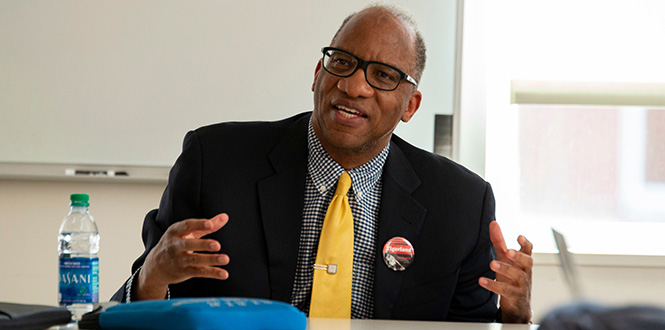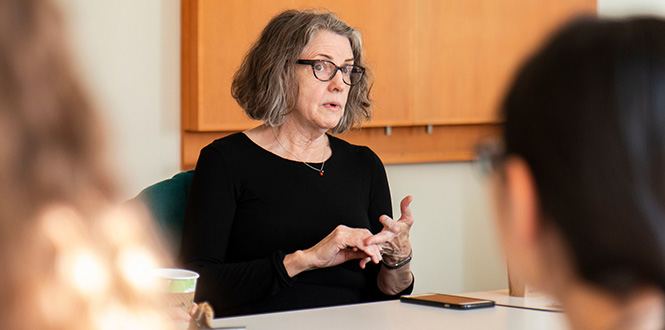Author, friend of the Montaño family gives poignant ‘Mando’ Memorial Lecture
May 06, 2019 — During an open afternoon in 2003, a 12-year-old Armando “Mando” Alters Montaño ’12 walked to a Colorado Springs movie theatre with family friend and acclaimed authored Wil Haygood.
They watched Fog of War, a documentary about Robert McNamara, the former U.S. Secretary of Defense, and then spent the next few hours dissecting the film, both the content and the techniques used by the filmmaker.
“They became friends,” said Diane Alters ’71, Mando’s mother. “Mando always looked up to Wil. He watched in awe when Wil tried to charm his way into SuperMax, a high-security prison in Colorado. He didn’t get in, but Mando was impressed he tried. Mando turned to him for advice. Wil always treated my son as an equal.”
 Author Wil Haygood speaks with Grinnell students during a roundtable event April 11 before the Montaño Memorial Lecture.
Author Wil Haygood speaks with Grinnell students during a roundtable event April 11 before the Montaño Memorial Lecture.
The relationship between Mando and Haygood was one of many special moments described when the Writers@Grinnell hosted the third annual Armando Alters Montaño ‘12 Memorial Lecture April 11 at Grinnell College. The event and lecture by Haygood honored the spirit and memory of Montaño.
A gifted journalist, Montaño died at the age of 22 in June 2012 in Mexico City, where he was working as an intern for the Associated Press shortly after graduating from Grinnell.
“I’m here because of a dear, dear human soul,” Haygood told the audience.
Montaño graduated as a Spanish major with a concentration in Latin American studies. During his time at Grinnell, he wrote and edited for the Scarlet & Black, interned at several newspapers, and took part in The New York Times Student Journalism Institute.
“Mando was an incredibly gifted journalist and writer and one of the most curious, good-humored, and lovable students I have ever known,” said Dean Bakopoulos, co-director of Writers@Grinnell, at the start of the memorial lecture. “His spirit is very much alive on this campus and in the hearts of all of us who had the privilege of calling him a student and friend.”
Mando’s parents, Alters and Mario Montaño, created the Armando Alters Montaño Writers@Grinnell Endowment Fund in 2015. The Class of 2012 supported endowing the fund through a fundraising effort during their 5th reunion in 2017.
 Diane Alters ’71, Mando’s mother, became friends with Haygood while both of them were working at The Boston Globe.
Diane Alters ’71, Mando’s mother, became friends with Haygood while both of them were working at The Boston Globe.
The fund supports the Writers@Grinnell program in memory of their son’s dedication to nonfiction and fiction writing, journalism, and the creative process. In addition, the endowment fund provides staff members of The Scarlet & Black student newspaper with opportunities for alumni mentoring and networking as well as student internships in the areas of creative writing, publishing, television, film, and other media.
For the past three years, the Armando Alters Montaño ’12 Memorial Reading has brought leading nonfiction writers to campus to speak.
As a reporter for the Boston Globe, Haygood traveled all over the world, including South Africa, where he witnessed Nelson Mandela’s liberation from prison; and Somalia, where he was kidnapped and ransomed by rebels. While at The Washington Post, he wrote the article that inspired the 2013 award-winning motion picture The Butler. He has also authored eight nonfiction books, including critically acclaimed biographies about Sammy Davis Jr., Sugar Ray Robinson, and Thurgood Marshall.
At the Grinnell event, Haygood read from his newly published book Tigerland: 1968-1969: A City Divided, A Nation Torn Apart, and a Magical Season of Healing. This book tells the story of two teams from a poor, black, segregated high school in Columbus, Ohio, that defeated bigger, richer, whiter teams from across the state to win the Ohio state baseball and basketball championships.
Haygood donated his honorarium for the lecture back to the College so that every student in attendance received a free copy of the book.
Haygood said Tigerland is exactly the kind of the book that Mando would enjoy. He imagines that Mando would have continued to be on the frontlines of good journalism, showcasing what good journalism can do.
“He was never an enemy of the people as us journalists have been unmercifully and wrongly attacked,” Haygood told the audience.
Haygood said there is nothing as sacred as the written word.
“I came to fall in love in love with journalism in the 1970s,” he said “The Watergate scandal was ripping the country apart. Great journalists at The Washington Post exposed that story. That made me want to work at the Post someday, that big bad newspaper. Those cats were fighting the fight. There is always the dark side of the road, but as we say in the masthead, democracy dies in darkness. Be the light. Journalism is a great light. It’s a phenomenal avocation. It’s soulful and righteous. We need great journalism now more than ever.”
The hour-long lecture video at the top of the article includes tributes to Montaño, the introduction of Haygood by Alters, Haygood’s reading, and a question-and-answer session.
— by Jeremy Shapiro